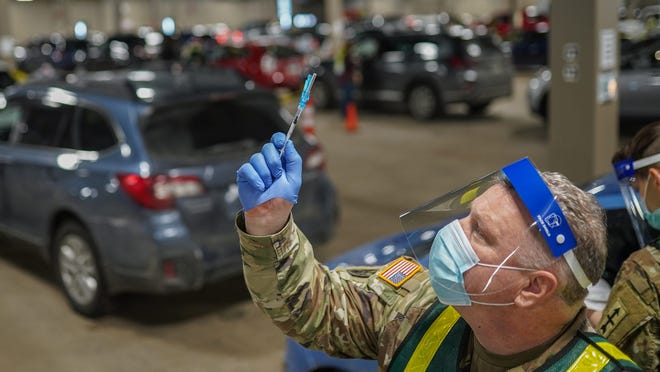It didn’t start like this. When the first picture popped up on Instagram of that person you know getting the COVID-19 vaccine, you felt elation. A certain relief that something different was coming. You were happy they were safe, and you hoped one day soon you’d know that feeling, too.
Months into the vaccine rollout, most Americans still don’t know that feeling. Public health officials warned it would take time to vaccinate everyone who desired it, but most people didn’t expect the confusion and inconsistences, they likely couldn’t prepare for the feeling of watching as some people near a return to normal, while they continue to wait.
Now when you see the picture, read the text, get the call that someone you know just got the vaccine, there’s another feeling, too: envy.
“Whenever you have a little bit of hope, and then it’s dashed, you’re going to either get depressed or angry or resentful,” said therapist Steven Stosny. “And sometimes you’re going to blame it on another person, even though it’s the system that’s really causing the stress.”

Millions of Americans have had to scramble to find vaccines. Some have spent hours obsessively refreshing websites, others have driven hundreds of miles for appointments. Rules about vaccine distribution vary by state, adding to feelings of frustration.
Analysis:COVID-19 vaccine distribution tarnished the ‘miracle’
COVID-19 vaccine rollout:It hasn’t worked, but change is coming
“I am so jealous of the people who have successfully scheduled vaccine appointments that I could scream,” Twitter user @RaxKingIsDead wrote. @Ann_Bourke_4 lamented, “I have such vaccine envy right now. Just gotta make it to April.”
USA TODAY spoke with mental health experts on how to navigate vaccine envy.
Recognize you’re not a bad person for feeling this way
Envy is a valid emotion, psychologists say, and it makes sense in this crisis. People have been waiting a long time to return to things they love – to return to one another – and seeing someone get something you covet can be painful.
Many people are also angry that they can’t do more to help people they love – elderly parents, disabled children. When someone feels powerless, they can engage in the attribution of blame.
“It doesn’t make you a bad person because you have these kinds of feelings,” said Robert Enright, a licensed psychologist and professor at the University of Wisconsin, Madison who studies moral development and the science of forgiveness.
Distinguish between envy and resentment
Experts say all of us are susceptible to envy when someone has something we want. We can envy a neighbor’s home, or a friend’s trip. Resentment, Enright said, is different. It’s what someone tends to feel when they believe someone has acted unjustly.
“If someone came to me and said, ‘I’m really resentful toward this other person,’ I would ask, ‘Tell me what you think is unfair?” he said.
If you feel envious your friend who’s a nurse got the vaccine, that’s valid. If you find yourself resenting them, this suggests you believe they did something wrong. In the nurse example, the resentment would be misplaced. However, if you know someone who did something dishonest to obtain the vaccine, then that would be unfair, you would resent the injustice, and, as Enright says, you would be in a position to forgive them.
With COVID, Enright said most individuals provoking feelings of envy or resentment are likely not at fault.
“It’s likely this person isn’t the one who is responsible for the distribution of fairness,” he said.
If you’re feeling excluded, don’t disconnect
The vaccine has created a divide – between those who can move through the world with less fear and more certainty, and those who feel they’re still living a nightmare.
Some people have watched their entire families get vaccinated while they continue to wait. Some are in friend groups where the vaccinated trade stories about their symptoms, while the unvaccinated quietly wish for their own.
If you’re in a social circle where many people are vaccinated and you’re not, Enright said it’s important to distinguish between what kind of exclusion you’re experiencing. Deliberate exclusion – not being invited to the party – or indirect exclusion – when you couldn’t get to the party because of traffic.
“Feeling excluded is a perfectly reasonable response, but there’s a big difference between those two categories,” he said.
Experts say you might try sharing your feelings with the group, so they can offer support. Stosny said it’s important to maintain “an attitude of connection.” Continue to reach out to people you love.
“The biggest antidote for resentment is connection,” he said.
Reframe your thinking, and forgive yourself if you need to
What’s difficult about envy and especially resentment, experts sai is that they tend to make us feel bad about ourselves.
“If you’re not careful, living with this envy, this feeling of direct exclusion, living with resentment, you can end up not liking yourself for … having these thoughts,” Enright said.
Negativity toward the self, he said, doesn’t promote mental well-being, while self-forgiveness under these circumstances could be quite healing.
Stosny also said these feelings can have a negative affect on our immune systems.
“Envy, jealousy and resentment increase inflammation, which makes us more susceptible to infection,” he said. “Focus on what you can do to make it more likely you’ll stay healthy. … The resentment, in the end, it’s not going to make the vaccine more available.”
